In 2021, car production in Britain fell to below 860,000 vehicles with exports lower while electric vehicle output surged. Engine manufacturing was sharply down.
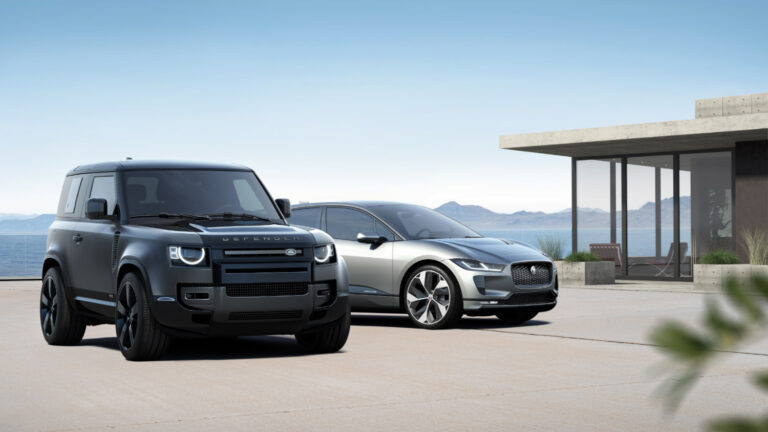
In full-year 2021, car production in the United Kingdom contracted by 6.7% to only 859,575 vehicles of which 82% were exported. Engine manufacturing and exports in Britain were sharply down in 2021. Electrified vehicles made up more than a quarter of total car manufacturing in Britain with battery-electric vehicle production up by 72%. Jaguar Land Rover was the top car producer in Britain in 2021 while the Mini was the top export model from the UK. The outlook for 2022 is positive and predicts an increase in UK car production to above a million vehicles despite continued supply-chain bottlenecks for electronic components.
Latest British Car Sales Data: 2024: Market Overview, Brands, Models, Electric; 2023-2008.
Car Production in Britain in 2021 (Full Year)
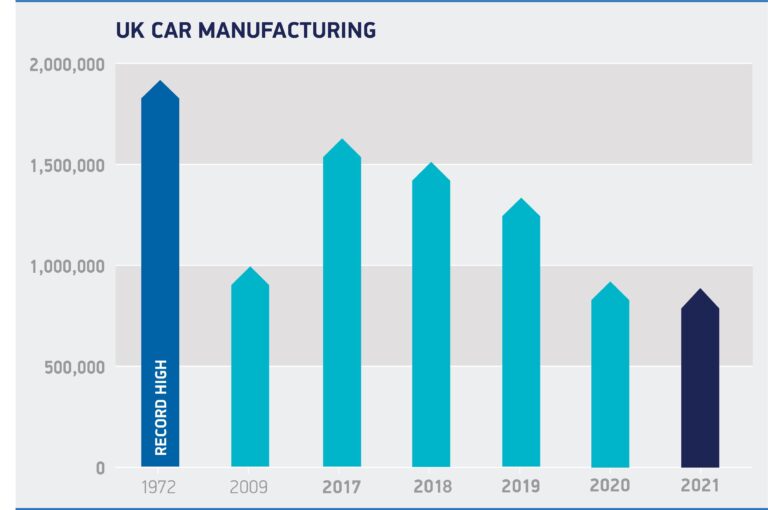
UK car production in 2021 fell -6.7% to only 859,575 units, according to figures released by the Society of Motor Manufacturers and Traders (SMMT), the worst total since 1956 when 707,594 cars were produced in Britain. British car output in 2021 was 61,353 vehicles less than 2020, which itself was badly affected by coronavirus lockdowns, and -34.0% below pre-pandemic 2019 when 1,303,135 vehicles were made in Britain.
Despite this, British car factories produced a record number of battery-electric vehicles (BEV), plug-in hybrids (PHEV), and hybrid electric vehicles (HEV), turning out almost a quarter of a million (224,011) of these zero and ultra-low emission vehicles, representing more than one-in-four (26.1%) of all cars made.
The shift to electrified vehicle manufacture continued apace as BEV production surged 72.0%, while hybrids rose 16.4%, as the UK industry – like the market – transforms into a low and, ultimately, zero-carbon industry.
Largest Car Producers in the UK in 2021
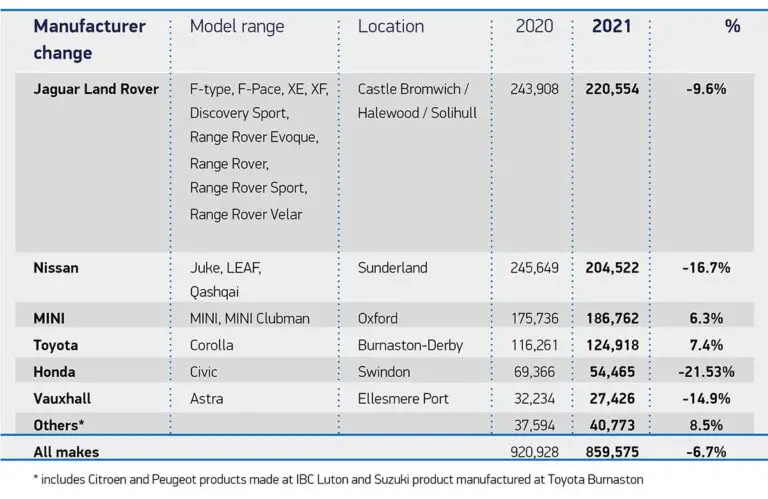
In 2021, Jaguar Land Rover (JLR) replaced Nissan as the largest carmaker in Britain in terms of local production volume. JLR production was down 9.6% while Nissan produced 16.7% fewer cars in 2021 than in 2020.
BMW-owned Mini was the third-largest car manufacturer in Britain in 2021 with production up 6.3% The Mini was also the top exported car from the UK by units in 2021. Toyota also increased production of the Corolla by 7.4% in the UK.
Honda, which is closing down its UK production operations, produced a fifth fewer Civic in Britain in 2021. Vauxhall also produced fewer cars but may receive a boost when the new Astra is introduced in the first half of 2022.
“Others” increased production and although the volumes are low, the value is often very high. It includes amongst others Rolls-Royce and Bentley that both had record global sales in 2021.
Reasons for Low Car Production in Britain in 2021
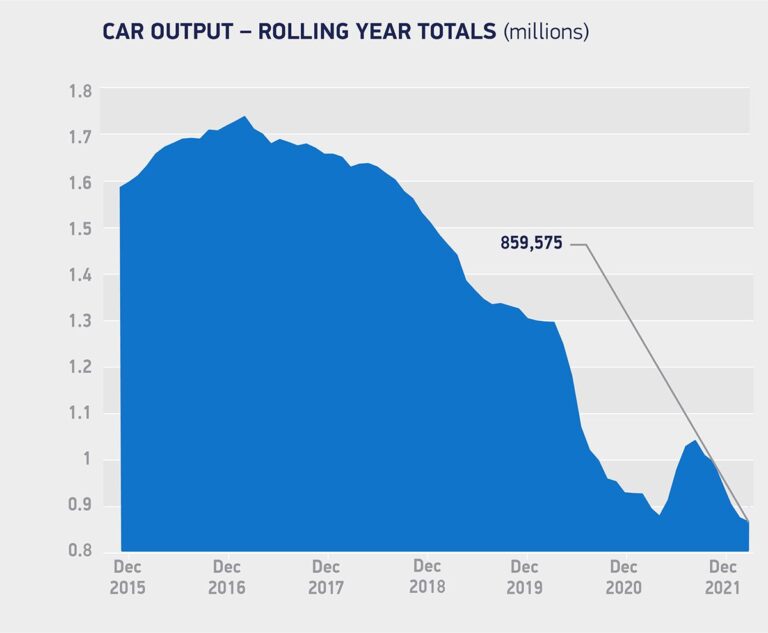
The overall poor performance of the British automotive industry in 2021 can be attributed to several factors, most of them direct consequences of the pandemic. The shortage of semiconductors, a critical component in modern car manufacturing, was the principal cause of the decline, with factories having to reduce or even pause production while awaiting parts whose supply has been heavily constrained by the global pandemic.
Manufacturers also wrestled with staff shortages arising from the need to self-isolate and depressed demand with car showrooms closed for months due to lockdowns and despite the success of ‘click and collect’ services. There were also non-Covid issues behind this fall, most notably the closure of a major UK car plant in July, which accounted for around a quarter of the annual decline.
Mike Hawes, SMMT Chief Executive, said, “2021 was another incredibly difficult year for UK car manufacturing, one of the worst since the Second World War which lays bare the exposure of the sector to structural and, especially, Covid-related impacts. Despite this miserable year, there is optimism. With Brexit uncertainty largely overcome with the TCA deal, investments have been unleashed, most of which will help transform the sector to its zero-emission future. This is a vote of global confidence in the UK but must be matched by a commitment to our long-term competitiveness; support for the supply chain in overcoming parts shortages, help with skills and training and, most urgently, measures to mitigate the escalating energy costs which are threatening viability.”
Car Exports from Britain in 2021 (Full Year)

Global exports continued to be the foundation for UK car manufacturing, with some eight-in-ten cars made being shipped overseas. Although annual production for overseas markets declined -5.8% to 705,826 units in 2021, volumes for the domestic market declined even more steeply, down -10.6% to 153,749.
The European Union remained the UK’s largest market by some considerable distance, increasing to 55.0% of exports, from 53.5%, and representing 388,249 units (-3.0% vs 2020), despite frictions and costs arising from the new trading arrangements. While automotive businesses were as well prepared as they could be, an SMMT member survey in April revealed some nine-in-ten (91%) firms were spending more time and resources managing UK/EU trade than in 2020.
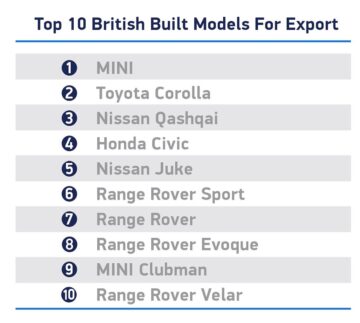
Shipments to several other major global markets also fell, with the US, Britain’s second-ranked export destination, down -10.5%, and Japan, the UK’s fourth-largest export market, down -36.1%. China, in third place, fared better, with exports up 0.6% to 57,356 units, reflecting strong market conditions in the country and demand for iconic British performance, luxury, and premium car brands. Exports to Canada, Australia, and South Korea, however, declined, -5.3%, -31.1%, and -29.7% respectively.
In unit terms, the Mini was the top export car from Britain in 2021 followed by the Toyota Corolla and Nissan Qashqai.
Car Engine Manufacturing in Britain in 2021

In 2021, UK engine manufacturing was down -10.8% to just over 1.6 million units. Production for domestic and overseas markets falls -3.6% and -15.4%, respectively.
British Car Production Outlook for 2022
Despite the dismal overall performance in 2021, there were significant developments that give the industry increased confidence. Following the avoidance of ‘no deal’ and the signing of the Trade and Cooperation Agreement (TCA), publically announced investment for the industry reached a potential £4.9 billion in 2021, the highest total since 2013. This included vital investment announcements in Ellesmere Port (Stellantis), Halewood (JLR), Norfolk, Sunderland (Nissan), and Surrey.
Moreover, a significant proportion of the announced investments was in support of electrified vehicles, with the expansion of existing facilities in the North-East and the proposed development of a new battery gigafactory in the West Midlands. The latter intention represents around half (£2.5 billion) of the total investment sum publically announced in 2021. Realizing such investments will be vital as the UK automotive manufacturing sector is expected to need at least 60 GWh of gigafactory battery capacity by 2030 if it is to remain globally competitive as trading requirements tighten.
The latest independent production outlook for 2022 (Auto Analysis November 2021) forecasts UK car production to increase to more than one million units, representing a 19.7% uplift on the 2021 total, despite the loss of production in Swindon. With favourable conditions, including an end to the global chip shortage, new models coming on stream, and the avoidance of additional trade barriers, car production could continue to climb and reach 1.1 million in 2025, with further growth beyond.
In 2021, Volkswagen became the best-selling car brand in Britain while the Vauxhall Corsa was Britain’s favorite car model and the Tesla Model 3 the top-selling electric car.
Latest British Car Sales Data: 2024: Market Overview, Brands, Models, Electric; 2023-2008.
